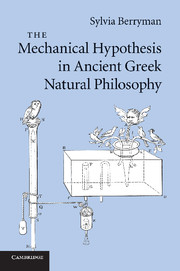Book contents
- Frontmatter
- Contents
- List of illustrations
- Acknowledgements
- Introduction
- 1 Mechanics and the mechanical: some problems of terminology
- 2 ‘Mechanistic’ thought before mechanics?
- 3 Mechanics in the fourth century
- 4 The theory and practice of ancient Greek mechanics
- 5 Ancient Greek mechanics continued: the case of pneumatics
- 6 The philosophical reception of mechanics in antiquity
- Conclusion
- Appendix: Ancient mechanics and the mechanical in the seventeenth century
- Bibliography
- Index of passages
- General index
Conclusion
Published online by Cambridge University Press: 24 December 2009
- Frontmatter
- Contents
- List of illustrations
- Acknowledgements
- Introduction
- 1 Mechanics and the mechanical: some problems of terminology
- 2 ‘Mechanistic’ thought before mechanics?
- 3 Mechanics in the fourth century
- 4 The theory and practice of ancient Greek mechanics
- 5 Ancient Greek mechanics continued: the case of pneumatics
- 6 The philosophical reception of mechanics in antiquity
- Conclusion
- Appendix: Ancient mechanics and the mechanical in the seventeenth century
- Bibliography
- Index of passages
- General index
Summary
To resume: this argument for the existence of a ‘mechanical hypothesis’ in ancient Greek natural philosophy began with a conceptual examination of the meaning of the terms ‘mechanical’ or ‘mechanistic’. I distinguished the use of the term ‘mechanical’ as a systematic description of perceived features of a view from the idea that the thinkers in question were explicitly motivated by their own conception of mechanics in formulating a view. Some ancient Greek thinkers can be described as ‘mechanistic’ in the latter sense, inasmuch as they did appeal to the field of mechanics to understand the natural world. This history has received less attention than it deserves.
A tendency to describe the ancient atomists as ‘mechanistic’ seems to have deterred scholars from looking for the impact of ancient Greek mechanics on late antique philosophy. Historians of science, meanwhile, have mistakenly concluded from some remarks of Galileo's that, in antiquity, mechanics was systematically excluded from natural philosophy. In the other direction, a few histories of technology think that ‘mechanistic conceptions’ can be found as far back as Homer. I set aside some misconceptions before studying the impact of ancient Greek mechanics on natural philosophy.
Tracing the history of mechanics, I argue that there is little evidence of it – in any sense of the term – from before the fourth century bce. Branches of the field were clearly developing in the fourth century. Nonetheless, there is little definitive evidence of what the term mēchanikē meant to Aristotle.
- Type
- Chapter
- Information
- The Mechanical Hypothesis in Ancient Greek Natural Philosophy , pp. 231 - 235Publisher: Cambridge University PressPrint publication year: 2009



